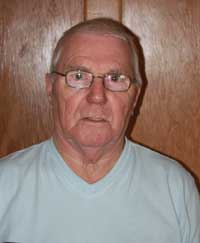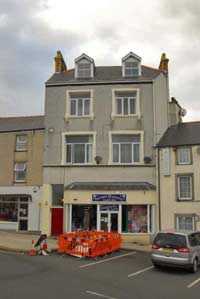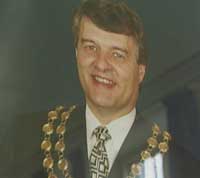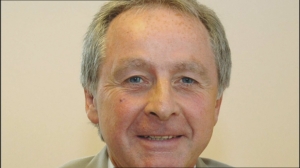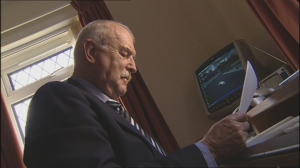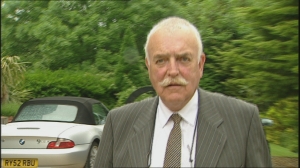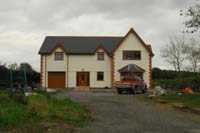16 September 2016 TODAY ONE of Anglesey’s most controversial figures was finally brought to book.
TODAY ONE of Anglesey’s most controversial figures was finally brought to book.
John Arthur Jones — disgraced council official and failed politician — was given an 18 months sentence for endangering RAF training jets.
Judge Geraint Walters told him he was a man driven by “arrogance”.
A jury had earlier found him guilty of 13 counts of shining bright lights into the cockpits of Hawk jets taking part in night manoeuvres at the Mona airfield.
The jets fly over Jones’ Parc Cefni business park next to his home in the village of Bodffordd near Llangefni.
The prison sentence is the climax of a saga that started more than thirty years ago.
For three decades John Arthur Jones ruthlessly exploited the council in his attempt to create a multi-million pound property empire.
♦♦♦
IN 2012 John Arthur Jones started a campaign against the RAF.
He objected to jets from RAF Valley using the Mona Airfield near his business park for night exercises.
Valley is home to the RAF’s 208 Squadron which uses Hawk jets to train fighter pilots.
Mona has been used by the RAF for more than a century.
Jones’ Parc Cefni business park, which also includes his home, is under the flight path of the Hawks.
Jones initially asked the RAF to change the route to avoid the complex which includes a children’s nursery.

- “JESUS” ARTHUR JONES
IN 1998 John Arthur Jones gave an interview to HTV’s current affairs programme Wales This Week. He’d just been sacked as Anglesey County Council’s Housing Director because the authority had lost confidence in him. Jones compared himself to Jesus: “A man stood in front of Pilate two thousand years ago and Pilate said I can see nothing wrong in this man. But at that time the Pharisees said crucify him. Now then, the descendants of those Pharisees are living today on Anglesey – they’re saying crucify him.”
He felt that the flights intensified after he made this request — and complained to the newspapers.
In September 2012 the Daily Mail published an article in which Jones threatened to step up his campaign.
He asked:
“Are our children being subjected, as some say in the village, to punishment by a gang of Hooray Henrys for daring to ask if they will fly over open fields instead of a children’s nursery?”
In another letter, he warned:
“Since you have refused to send independent observers to Parc Cefni I will be arranging for a weather balloon to be raised daily at the corner of our property. It will be taken down each evening at midnight.”
This prompted the RAF to ask North Wales Police to visit Jones — a move he branded “heavy-handed and sinister”.
He dropped the weather balloon idea — but in 2013 began to shine a bright light into the cockpits of the jets as they approached Parc Cefni.
Several landings at Mona had to be abandoned because of the danger to pilots.
Undercover police mounted a surveillance operation and, on one occasion, saw Jones tracking the planes with a powerful torch.
In October 2014 he was charged in connection with 13 incidents of endangering aircraft between November 2013 and September 2014.
Jones denied all the charges and called members of his family to give evidence.
His daughter Catrin Lloyd Davies, a solicitor, and her husband, army captain Gareth Lloyd Davies gave Jones an alibi for one of the incidents.
They said the family had had a meal together and Jones didn’t leave the house.
Jones denied his campaign was actually driven by his failure to sell any of the planned holiday chalets on the site because potential buyers were put off by the jets.
Jones’ barrister Lisa Judge compared her client to the TV character Victor Meldrew.
In June this year a jury of 11 found him guilty of all 13 counts.
♦♦♦
THIS AFTERNOON Jones’ barrister Lisa Judge asked for an adjournment, telling the court Jones had attended a medical examination this morning.
Another was booked tomorrow — with a biopsy scheduled for later this month.
She said he was “a man potentially facing death” with a possibility “he could die in prison”.
Judge Walters said that he’d been told nothing about these tests until this week.
He noted that it was John Arthur Jones who had commissioned the examinations — and that he was paying for them privately.
He’d heard nothing from a consultant telling him exactly what the problem was.
In the absence of a proper diagnosis, he said, the claim that John Arthur Jones might be dying was simply “courtroom advocacy”.
He dismissed the application.
He told Jones he was a man of “arrogance”.
He did not believe his claim that his campaign against the RAF was motivated solely by concern for the children attending the nursery at Parc Cefni:
“That was only one of the many lies you told during the trial.”
His actions were “highly reckless”.
He sentenced him to 18 months in gaol for each of the 13 counts, the sentences to run concurrently.
Tonight he is on his way to Altcourse Prison in Liverpool …
♦♦♦
JOHN ARTHUR JONES’ interest in the Bodffordd area began in the 1980s.
He bought a piece of agricultural land on a hill overlooking the village.
It enjoyed a magnificent view of the island, the nearby Cefni Reservoir and Snowdonia.
In 1987 Jones applied for planning permission to build a bungalow at the top of the hill.
He wrote to the director of planning to say that “for 10 years I have been looking for a suitable site on which to develop a fish farm”.
This particular site was perfect for the operation, he said, but there was just one snag — security.
Jones wrote:
” … the best possible deterrent is to live on the site and be in a position to see the ponds by day and which can be lit up at night.”
Planners were opposed.
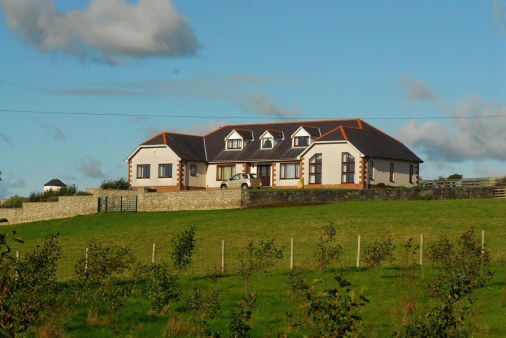
- COUNCIL HOUSE
THIS IS Nant Garedig, the house John Arthur Jones built in the 1990s. It’s one of scores of houses constructed by Anglesey councillors on land that the council’s own plans say shouldn’t be built on. The current owners have no connection to John Arthur Jones.
Photo: Rebecca
The application was in “conflict with the approved Anglesey Structure Plan Policies”.
But approval was given by other officers using delegated powers.
By 1990, by which time Jones had been appointed Housing Director, the permission to build the bungalow had sprouted dormer windows.
The fish farm never materialised.
At present day values, the planning permission was worth between £125,000 and £150,000.
He did not start building the house — known as Nant Garedig — until the mid 1990s.
The construction was to be as controversial as the planning permission …
♦♦♦
WHEN JOHN Arthur Jones finally built Nant Garedig he did it on the cheap.
The foundations included hardcore which came from the former Shell oil terminal at Rhosgoch.
The council took control of the terminal in 1990, the year John Arthur Jones became Director of Housing.
The site was managed by the Housing Department.
At that time there were some 15,000 tonnes of hardcore left on the site.
In the years that followed much of it disappeared.
John Arthur Jones placed an ad in the local paper calling for tenders for what he called the remaining “random rubble”.
One of the successful tenders — for 200 tonnes at 50 pence a tonne — came from John Arthur Jones himself.
It went into the foundations of Nant Garedig.
The Housing Department did not send its Director a bill until two and a half years later.
Jones said he had asked for an invoice on three separate occasions.
When the District Auditor investigated this issue, he noted that this invoice was finally raised “during the period when the Director was being investigated by the police”.
The council also accepted a bid for the “random rubble” from a builder called O J D Griffiths.
In October 1996 John Arthur Jones drafted a letter warning the contractor that he had “carried a large quantity of stone” from the site “in direct contravention of the prohibition” not to enter the site without permission.
The implication was that he’d taken the stone without paying for it.
“Before I refer the matter to the Police for further investigation,” Jones continued, “I invite you to respond to these allegations.”
O J D Griffiths never got the chance to reply because the letter was never sent.
An official in the Housing Department, Paul Roberts, noted:
“John Arthur Jones … said letter not to go – speak to the contractor instead.”
The District Auditor investigated.
“I am particularly concerned,” he wrote in his report, “to discover that during this period Mr O J D Griffiths was undertaking work on the home of Paul Roberts … and later in the year sold and delivered hardcore from the [Rhosgoch] site to the Director of Housing and Property [John Arthur Jones] which was in the process of being constructed.”
“The apparent lenient approach taken by these officers towards this contractor represents, in my view, extremely poor judgement, particularly in the light of their personal contractual relationship with the contractor.”
At the same time the District Auditor was investigating, police began looking at some of the men working on the building of Jones’ new house.
Several were receiving housing benefit.
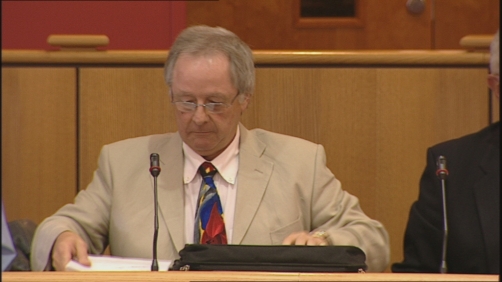
- “I DON’T BELIEVE IT!”
JOHN ARTHUR JONES — the man his barrister likened to Victor Meldrew — is no stranger to the police. In the late 1990s, after he’d been arrested by the North Wales Police investigating his use of builders on housing benefit, he went on holiday with a detective inspector from the same force. In the same period he also offered the former head of Anglesey police a contract — tracking down housing benefit fraudsters …
At the time his own housing department was mounting an operation to prevent housing benefit fraud.
John Arthur Jones was arrested in 1997 by detectives from the North Wales Police.
Eventually, he was charged with misuse of public office, intimidating witnesses and attempting to pervert the course of justice.
The case later collapsed after prosecution witnesses admitted discussing the case during the trial.
♦♦♦
BUT MAKING a small fortune on his new home wasn’t enough for John Arthur Jones — he wanted to be a property tycoon.
In the early 2000s Welsh Water decided to sell its Bodffordd depot next to the Cefni Reservoir.
John Arthur Jones thought it was an ideal site for a private housing development.
He bought the five acre site for £241,000 in September 2003.
The previous month he’d sold Nant Garedig for £365,000 — and moved into the small bungalow that came with the Welsh Water depot.
He wanted permission to build 22 Canadian-style wooden chalets.
The council was happy to give him permission but insisted on conditions, the most important of which was that the park be managed as a single business.
This meant that Jones could not sell individual plots.
He has always maintained that this condition was unlawful and, many years later, a government planning inspector agreed and ordered the council to remove the condition.
Jones has always insisted that those people who criticised his plans “… have a personal agenda based on malice and jealousy”.
Jones built two of the Canadian-style chalets but was never able to sell either of them on the open market.
The fact that the RAF conducted low-flying exercises was one of the reasons which put off potential buyers.
The remaining 20 chalets have never been built.
♦♦♦
IN 2004 John Arthur Jones was elected to the council.
A year later he had his own political party — the Radical Independents.
There were just four members — Jones was the leader and he was joined by Hefin Wyn Roberts, John Rowlands and David Lewis Roberts.
The group was small but held the balance of power on the island.
The glue that held the Radical Independents together was greed.
John Rowlands and David Lewis Roberts wanted the valuable planning permissions — worth between £100,000 and £150,000 — which John Arthur Jones and Hefin Wyn Roberts already enjoyed.
John Rowlands got his almost immediately, despite objections from planners.
He’d given a field to his daughter and she was given permission to build a new house because she wanted to return to the island.
After she received the permission, she sold the site for £150,000.
David Lewis Roberts went one step further.
He secretly bought a plot of land near Benllech — and then tried to smash the council’s green belt policy preventing new building in the area.
When another councillor accused Roberts of corruption, Roberts complained to the Ombudsman who referred the matter to the council’s Standards Committee.
The committee decided that David Lewis Roberts was, indeed, corrupt.
It ruled that his conduct “had been within the generally understood meaning of ‘corrupt’ …”
and
“gave a clear impression that he had misused his position for personal advantage, and that it amounted to the criminal offence of misconduct in public office.”
The police were not interested in prosecuting Roberts.
But the electorate took a dim view of the chaos John Arthur Jones and his Radical Independents had unleashed.
In the election of 2008, John Arthur Jones lost his seat.
The turmoil he’d triggered continued for years afterwards, forcing the Welsh government to take over the running of the council in 2011.
The intervention lasted several years.
♦♦♦
Published: 16 September 2016
© Rebecca
♦♦♦
Note
This article is based on a series of pieces already published. They are:
♦♦♦
DONATIONS
If you would like to support the work of Rebecca, you can do so by clicking on the DONATE button.
CORRECTIONS
Please let us know if there are any mistakes in this article — they’ll be corrected as soon as possible.
RIGHT OF REPLY
If you have been mentioned in this article and disagree with it, please let us have your comments. Provided your response is not defamatory we’ll add it to the article.





 Posted by Rebecca
Posted by Rebecca 













